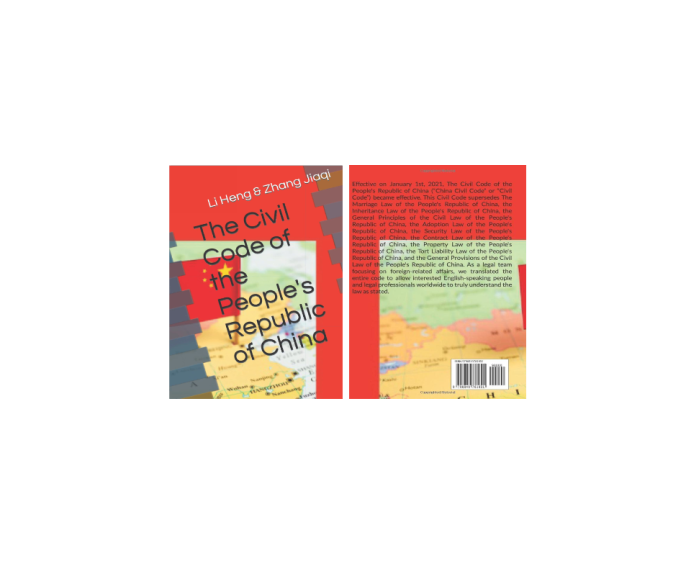
全国服务热线:
18521536308The Civil Code of the People's Republic of China
2022-06-25
(版权声明:《中华人民共和国民法典》英文版译著由上海金律团翻译有限公司的李恒律师、张佳奇律师合作完成。未经本公司许可,不得擅自复制传播!)
网址:https://www.amazon.com/dp/B0BD24C6SS
网址:https://www.amazon.com/dp/B0BD24C6SS

The Civil Code of the People's Republic of China
(published by Kindle Unlimited)
Article 1 This Code is formulated in accordance with the Constitution of the People's Republic of China and is aimed to protect legitimate rights and interests of persons and regulate civil relations, maintain a stable social and economic order, satisfy the requirements in development of socialism with Chinese characteristics, and propagate the core socialist values.
Article 2 The civil laws regulate personal and property relationships between and among persons, including but not limited to natural persons, legal entities, and unincorporated entities with equal legal status.
Article 3 The personal and property rights and other legitimate rights and interests of any person shall be protected by law from being infringed upon by any entity or individual.
Article 4 All persons shall have equal legal status in civil activities.
Article 5 Civil activities shall follow the principle of free will, and any person shall be entitled to create, alter, or terminate a civil legal relationship of their free will.
Article 6 Civil activities shall follow the principle of fairness and equity while reasonably determining the rights and obligations of any person.
Article 7 Civil activities shall follow the principle of good faith and honesty, and all persons shall honor their commitments in good faith and with honesty.
Article 8 No person shall conduct civil activities which violate laws, public policies, or ethical standards.
Article 9 Civil activities shall be performed in a manner conducive to conserving resources and protecting ecology and the environment.
Article 10 Civil disputes shall be resolved according to law or may be resolved in accordance with the customs in the absence of an applicable law or rule; provided, however, that the customs shall not violate public policies or ethical standards.
译者按:
1、“民事主体”一词,在本译著中根据上下文需要翻译成“person”及其变体形式。译者认为这个词准确地表达了原文的含义,未采用传统译法中使用的“party to a civil relation”、“civil subject”等译法。
2、“涉外”一词,在本译著中翻译成“international”。译者认为这个词准确地表达了原文的含义,未采用传统译法中使用的“foreign-relate”、“involving foreign affairs”等译法。
3、“代理”、“代理人”,在本译著中分别翻译成“represent/representation”、“representative”。译著认为,这种译法涵盖了“法定代理”和“委托代理”这两种代理形式的含义,比“agency”、“agent”的含义更为广泛,因此这种译法更为准确地表达了法条的含义。
- 联系电话: 18521536308、
- 微 信 号:ZJQ18521536308
- Q Q:3053323860
- 邮 箱:EliteLawyers@outlook.com

扫码关注我们
Copyright 2021 上海金律团翻译有限公司 All Rights Reserved 沪ICP备2022023473号-1
 技术支持:索腾网络
技术支持:索腾网络

